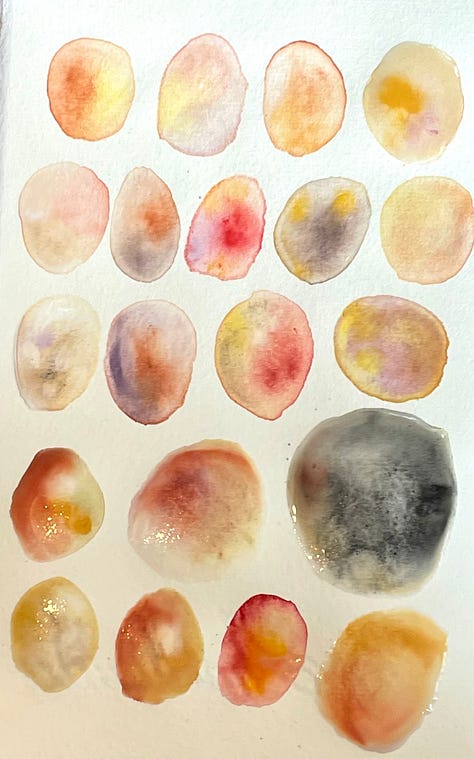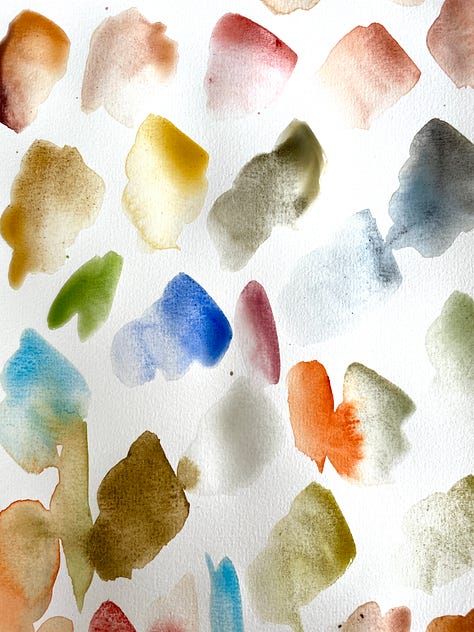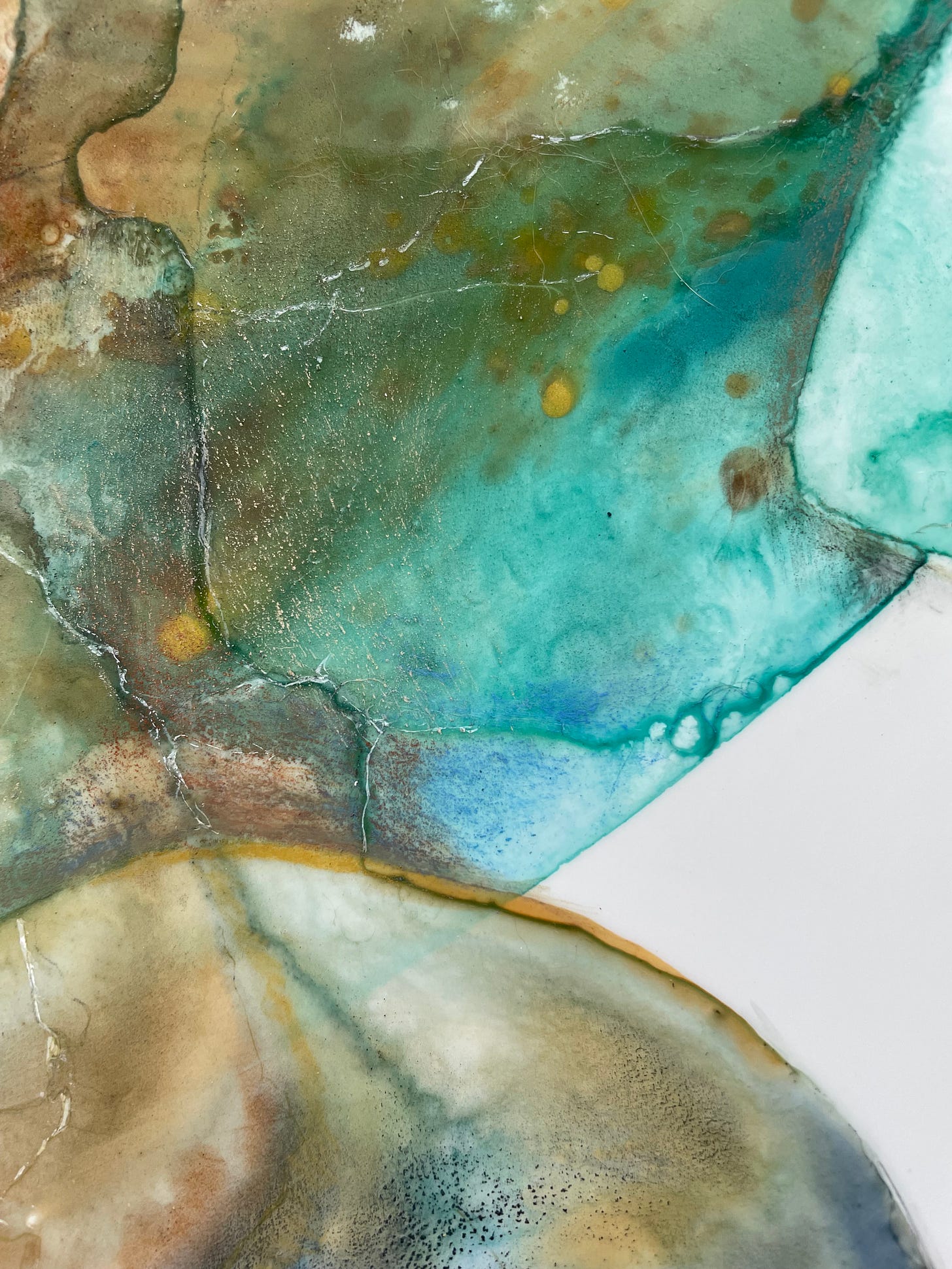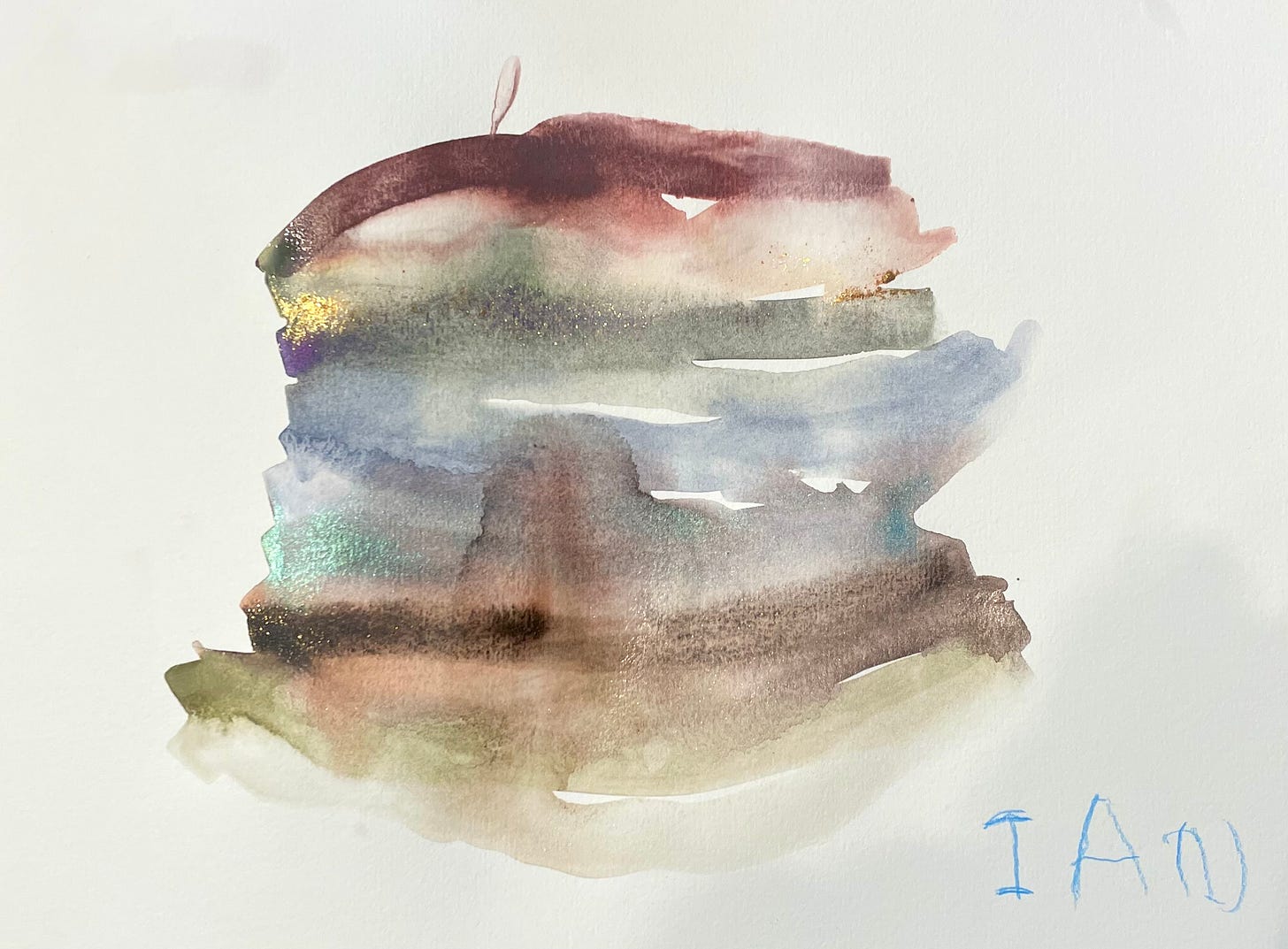Patti Smith, arguably my most revered creator on the planet right now, said something recently that struck me. In one of her Substack videos, she spoke of “writing or speaking about nothing,” how we often sit down with nothing to say, and still, something comes. A word. A note. A gesture. A moment. Even art.
Something from nothing.
Is there ever really such a thing as creating something from nothing?
I’ve been turning that question over and over like a stone in my pocket and it brought me back to something my dear friend Lynne wrote to me just recently, when she showed me a photo of a new watercolour notebook she had begun. The paper was beautiful—soft and toothy, thick enough to carry a substantial wash and for colour to be lifted and scrubbed on a bit. We talk a lot about paper, Lynne and I—it’s about the most important thing to a watercolourist, and finding your own perfect paper can take a long time. She had painted a single glorious swatch on the first page of her book. Just one. A wash of nuanced green with exquisite edges. She wrote—gently, humbly—“honestly kateri, it’s about all i can muster these days. i just want to see some beautiful paint mixing together and drying…”
I looked at that swatch and saw an entire world.
The book. The paper. The paint. Her hand. Her heart.
None of it came from nothing.
The paper began as cotton grown from seeds, and from the long line of seeds that came before them. Once, it was carried by wind and bird, then later planted and cultivated by calloused hands that each had their own story. Those cotton seeds and the plants that grew from them, like every other seeds, held centuries—and possibly even millennia—of sun, of soil, of storm and stillness. The field it grew in was shaped by time, by fallen leaves and ancient rivers and the long, slow decay that feeds life over and over again. The paper was not a blank canvas; it was already rich with stories before Lynne ever touched it.
The paint? Pigments ground from minerals and earth, maybe flower or insect or lichen, natural schist and mica. Some pigment colours that we now take for granted were once traded like jewels. Some are unearthed after millennia and ground into powders that human hands gather, then mix with water and gum of the acacia tree, and mull into glistening, smooth watercolours poured into tiny pans or tubes. Sometimes honey is used—and let’s pause to pour our hearts and minds over that wonder of the natural world and every single element that has transpired to give the bees the materials they need to create their art.
And the brush—wood from a tree that knew rain and frost, bristles perhaps from a creature once alive with a story of his or her own. Think of all of the parts of these things, all of the histories contained in each and every material used, and then shaped and crafted into a paintbrush by human hands belonging to unique human beings with vast ancestry and circumstances of their own. Each of these tools passed through markets, shops, studios, carried by the work of others until it arrived in the artist’s hand.
And then—there is Lynne. Her own becoming. The way her ancestry and bloodlines have given her life. How all of her days on this earth so far, her joys and griefs and sorrows and hard work and elation and disappointments and inextinguishable quiet hope had led her to that moment. That swatch. That “all I can muster” beautiful swatch.
Tell me: what part of that is nothing?
Even the simplest gesture—the lightest mark on a page—holds galaxies of effort, of memory, of time. Every creative act is made of everything that came before it. No matter how small it feels.
We are never creating from nothing. We are part of an infinite unfolding.



If all I can do today is open my notebook and place a single swatch of colour on the page—I am going to do it, and I am going to honour it. That mark contains the sun and rain, the soil and the seed, the hand and the breath, the story of my life and all that made me. I see it the same way for you, and for all of us.
No creative act is too small. None are insignificant.
Each one holds the universe.
Never, ever forget that.
One more thing—perhaps the most important—that Patti also touched upon, and that nudged me over and over during this pondering: I must never forget the privilege of even having the space to reflect on these things. To sit quietly, to place a brush to paper, to wonder aloud about seeds and soil and stardust. While I am writing this, nibbling on popcorn, sipping a decaf coffee, hemming over word choice and sentence length and whether any of my inner thoughts make enough sense to share, there are women and men—mothers, fathers, elders, children—living every moment under the weight of war, of famine, of poverty, of inequality, of displacement. Some are trying simply to survive the day. Some have been sent into harm’s way at the grotesquely powerful hands of warmongers, used as pawns in battles they never chose. The fact that I can make art, that I can rest, that I can even think about beauty and meaning—this is not just a gift, it is a staggering privilege. A stroke of sheer luck, to be born where and when and to whom I was born and all who came before me. May I never forget that. And may my gratitude move me—not only in words, but in how I live, how I give, and how I honour those who cannot afford to dream.
Is this all I can muster? Yes. And that is precisely the point.
I do not need to make something profound for it to be holy.
I only need to be real and true. To step forward not with certainty, but with wonder. With curiosity. With reverence for what I do not know.
Can you imagine if people started making art just to honour this moment? To say, I am here. We are here. To listen and to notice. To praise the ordinary. To soften the world. Maybe then art would return to its oldest, truest form: not a commodity to be sold, but a communion to be shared. A way of being in relationship with ourself, the world, and each other. Imagine a world where a swatch of colour, a line drawn in dirt, a scrap of poetry whispered to a tree—was enough. Not because it can be sold, but because it’s true. Art would no longer be a ladder, but a circle. No competitions. No gatekeepers. Only offerings. Presence.
Beauty in the hands of everyone.
Nothing = everything.










"I do not need to make anything profound for it to be holy." I loved the whole piece, but tht sentence I really love. Won't forget it. Thank you.
I loved how your piece implicitly champions vulnerability in creation. Lynne's "honestly kateri, it’s about all i can muster these days" is so relatable, and it’s in that raw honesty that the real beauty lies. We often feel this immense pressure to be "on," to be constantly producing, but sometimes the most authentic thing we can offer is a small, honest whisper of what we’re capable of in that moment. There's a humble humor in acknowledging our limitations, and ironically, that often makes our work more accessible and powerful to others.
It’s a bit like life, isn't it? The moments we try to force perfection often feel stiff and unnatural, but when we lean into the messiness, the humor of our imperfections, that's where true connection happens